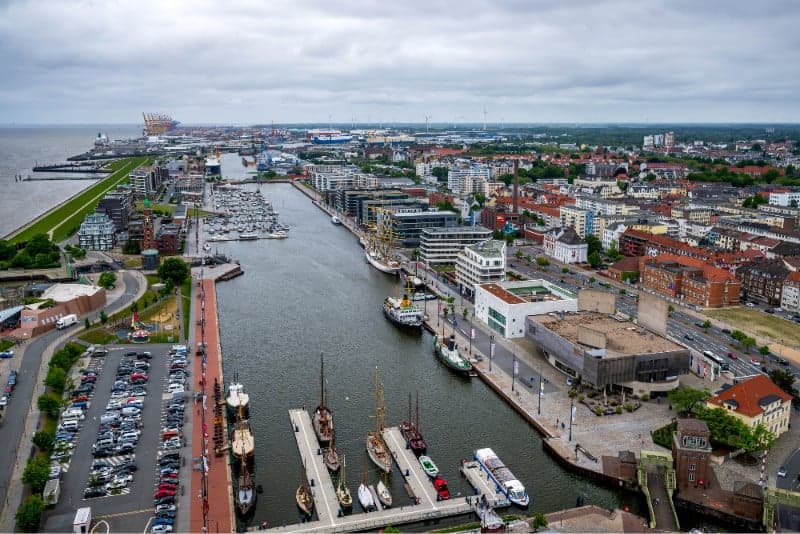REVEALED: Where are the 10 cheapest cities to rent in Germany?

Rental costs are going up in Germany, but there are still a handful of cities where you can find a reasonable rent. Here are the top 10 cheapest - and how to find a flat in the first place.
Looking to move? Find your next rental apartment here.
According to Germany’s Housing Ministry, around 54 percent of households across the Bundesrepublik rent rather than buy.
That's a notably high figure by European standards, considering that less than 30 percent of households in the EU rent their homes.
Within Germany, the proportion of households living in rented accommodation is particularly high in cities, whereas the proportion of owner-occupiers is higher in rural areas.
READ ALSO: The reasons why so many Germans rent rather than buy
What are the average rental costs?
In 2022, the average gross cold rent per square metre was €8.70, according to the latest figures from Destatis, Germany's statistical office.
In small towns, renters can expect to fork down €7.50 per square metre, whereas the costs in large cities averaged €9.60 per square metre.
Nevertheless, there are a sprinkling of cities in the Ruhr region in North Rhine-Westphalia, as well as in eastern Germany, where you can still snag a bargain.
This holds especially true when compared to cities like Munich, where the average rent now exceeds €18 per square metre.
READ ALSO: EXPLAINED: In which German cities are rent prices rising the fastest?

The city of Magdeburg, looking particularly picturesque after a light snowfall. Photo: picture alliance/dpa | Stephan Schulz
So what are the cheapest German cities to rent in, based on the latest costs per square metre?
Chemnitz (Saxony): €5.63
Gelsenkirchen (North Rhine-Westphalia): €6.46
Hagen (North Rhine-Westphalia): €6.66
Magdeburg (Saxony-Anhalt): €6.71
Bremerhaven (Bremen) €6.86
Salzgitter (Lower Saxony): €6.88
Remscheid (North Rhine-Westphalia): €7.00
Herne (North Rhine-Westphalia): €7.06
Recklinghausen (North Rhine-Westphalia): €7.11
Halle (Salle) (Saxony-Anhalt): €7.11
READ ALSO: Why is home ownership in Germany so low?
How do I find a rental in the first place?
Even in these more affordable cities it can still be difficult to find a rental, whether your own flat or a room in a WG. Here are a few tried and true tips which might make the search a little less strenuous.
Go to social media and local groups: Join Facebook groups or other online communities that specialise in flat hunting or the property market in your region. They often offer cheap flats or share recommendations.
Use personal contacts: Tell friends, family, colleagues and acquaintances that you are looking for a flat. Sometimes they can help in the search by telling you about available flats in their area - or maybe they'll even be moving soon.
Make compromises: Be open to different flat sizes or alternative living arrangements. Lower your expectations and broaden your options.
Rent directly: Try to find flats directly from private landlords or small rental companies rather than going through large agencies, which tend to offer more newly constructed, and hence pricier, places. Often rents are cheaper with private rentals.
Join a housing cooperative: Find out about housing cooperatives or non-profit housing associations in the area you want to live. They often offer low-cost housing, especially for people on low incomes. However, waiting times tend to be very long.
Negotiate: Don't be afraid to negotiate the rent with the landlord, as they might be willing to lower the price. This especially holds true if you want to rent the flat for a longer period of time, carry out certain repairs yourself, or purchase all of the furniture and appliances from a previous tenant.
Move away from the city centre: Consider moving to the outskirts of the city. Rental prices are lower there and good transport connections are usually also available.
READ ALSO: 10 types of flat rental adverts you're bound to see in Germany
Comments
See Also
According to Germany’s Housing Ministry, around 54 percent of households across the Bundesrepublik rent rather than buy.
That's a notably high figure by European standards, considering that less than 30 percent of households in the EU rent their homes.
Within Germany, the proportion of households living in rented accommodation is particularly high in cities, whereas the proportion of owner-occupiers is higher in rural areas.
READ ALSO: The reasons why so many Germans rent rather than buy
What are the average rental costs?
In 2022, the average gross cold rent per square metre was €8.70, according to the latest figures from Destatis, Germany's statistical office.
In small towns, renters can expect to fork down €7.50 per square metre, whereas the costs in large cities averaged €9.60 per square metre.
Nevertheless, there are a sprinkling of cities in the Ruhr region in North Rhine-Westphalia, as well as in eastern Germany, where you can still snag a bargain.
This holds especially true when compared to cities like Munich, where the average rent now exceeds €18 per square metre.
READ ALSO: EXPLAINED: In which German cities are rent prices rising the fastest?

So what are the cheapest German cities to rent in, based on the latest costs per square metre?
Chemnitz (Saxony): €5.63
Gelsenkirchen (North Rhine-Westphalia): €6.46
Hagen (North Rhine-Westphalia): €6.66
Magdeburg (Saxony-Anhalt): €6.71
Bremerhaven (Bremen) €6.86
Salzgitter (Lower Saxony): €6.88
Remscheid (North Rhine-Westphalia): €7.00
Herne (North Rhine-Westphalia): €7.06
Recklinghausen (North Rhine-Westphalia): €7.11
Halle (Salle) (Saxony-Anhalt): €7.11
READ ALSO: Why is home ownership in Germany so low?
How do I find a rental in the first place?
Even in these more affordable cities it can still be difficult to find a rental, whether your own flat or a room in a WG. Here are a few tried and true tips which might make the search a little less strenuous.
Go to social media and local groups: Join Facebook groups or other online communities that specialise in flat hunting or the property market in your region. They often offer cheap flats or share recommendations.
Use personal contacts: Tell friends, family, colleagues and acquaintances that you are looking for a flat. Sometimes they can help in the search by telling you about available flats in their area - or maybe they'll even be moving soon.
Make compromises: Be open to different flat sizes or alternative living arrangements. Lower your expectations and broaden your options.
Rent directly: Try to find flats directly from private landlords or small rental companies rather than going through large agencies, which tend to offer more newly constructed, and hence pricier, places. Often rents are cheaper with private rentals.
Join a housing cooperative: Find out about housing cooperatives or non-profit housing associations in the area you want to live. They often offer low-cost housing, especially for people on low incomes. However, waiting times tend to be very long.
Negotiate: Don't be afraid to negotiate the rent with the landlord, as they might be willing to lower the price. This especially holds true if you want to rent the flat for a longer period of time, carry out certain repairs yourself, or purchase all of the furniture and appliances from a previous tenant.
Move away from the city centre: Consider moving to the outskirts of the city. Rental prices are lower there and good transport connections are usually also available.
READ ALSO: 10 types of flat rental adverts you're bound to see in Germany
Join the conversation in our comments section below. Share your own views and experience and if you have a question or suggestion for our journalists then email us at [email protected].
Please keep comments civil, constructive and on topic – and make sure to read our terms of use before getting involved.
Please log in here to leave a comment.